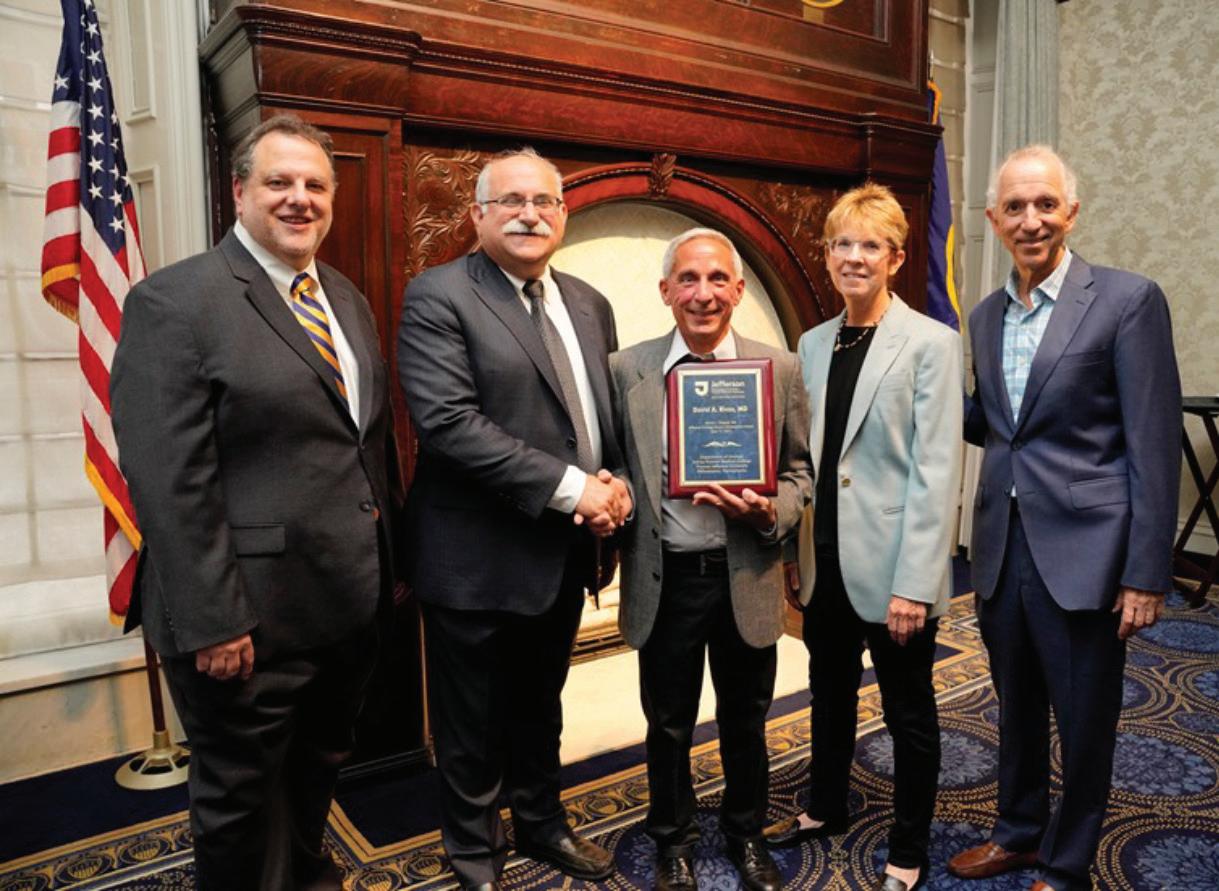
8 minute read
Advancing the Science in Prostate and Bladder Cancers
The lab is reaching critical mass with five graduate students, three pursuing PhDs and two pursuing M.S. degrees. Each student is on a steep trajectory toward making discoveries in their unique projects, and their work is critical for better understanding the molecular mechanisms of prostate and bladder cancer development/progression, as well as in the development of novel treatment strategies and biomarkers.
DR. MATT SCHIEWER Assistant Professor and Vice Chair for Basic Science Research in the Department of Urology at Thomas Jefferson University and the Sidney Kimmel Cancer Center (SKCC)

ASSISTANT PROFESSOR AND VICE CHAIR FOR BASIC SCIENCE RESEARCH IN THE DEPARTMENT OF UROLOGY AT THOMAS JEFFERSON UNIVERSITY AND SIDNEY KIMMEL CANCER CENTER (SKCC) Dr. Schiewer obtained his PhD in Genetics from Thomas Jefferson University in 2012 and
Matt Schiewer, PhD did his postdoctoral training under the mentorship of Dr. Karen Knudsen. His PhD work was funded by the Department of Defense, and his postdoctoral work was funded by the Prostate Cancer Foundation. In November 2019, he began his independent lab in the Department of Urology. The Schiewer lab is interested in GU malignancies, specifically transcriptional regulation, hormone signaling, cell cycle, and DNA repair in prostate and bladder cancers. Work in the Schiewer lab has been funded by the American Cancer Society, the Philadelphia Prostate Cancer Biome Project, Pennsylvania Department of Health, and institutional startup funds.

LESS TOXIC TREATMENT FOR BLADDER CANCER Salome Tchotorlishvili’s desire to improve healthcare options fueled her passion to pursue a career in research and apply for MS program in Biomedical Sciences at Thomas Jefferson University.

Sal Tchotorlishvili, BS
Her focus? To improve treatment options for chronic diseases with no curative treatment. So, she joined SKCC.
Novel combination strategies to treat cancer are being defined by MS students Salome Tchotorlishvili and Jasibel Vasquez Gonzalez.
Moriah Cunningham was nominated for a Howard Hughes Medical Institute (HHMI) Gilliam Fellowship.
Moriah Cunningham became the first Ph.D. candidate in the lab after passing her qualifying exam.
“Dr. Schiewer’s drive and passion captivated my interest and drew me to bladder cancer research. Bladder cancer is one of the most expensive malignancies to treat over a patient's lifetime. I hope to help alleviate the tremendous economic burden of bladder cancer treatment by filling gaps in knowledge,” Tchotorlishvili said.
Tchotorlishvili is working on a project to evaluate the combination of cisplatin and Poly (ADP-ribose) polymerase (PARP) inhibition in bladder cancer.

“If cisplatin and PARP inhibitors are additive/synergistic, I would like to explore the mechanisms involved. The potential synergistic effects of PARP inhibitors and cisplatin can elucidate novel treatment options,” she said. “The current standard of treatment for patients with muscle-invasive bladder cancer is chemotherapy followed by surgical removal of the bladder. However, many patients are not eligible for chemotherapy due to its severe toxicity. The use of PARP inhibitors and cisplatin in bladder cancer can potentially reduce the effective dose of cisplatin to overcome dose-limiting toxicity.”
Moriah Cunningham, BS
PAYING PROSTATE CANCER RESEARCH FORWARD Moriah Cunningham, a third year PhD candidate in the Cell Biology and Regenerative Medicine program, is studying the impact of DNA damage in prostate cancer progression.
Her research goals include not only doing it, but also communicating what she learns and inspiring others to act.
“In late 2020, I saw a presentation done by Dr. Schiewer, and I was compelled to email Dr. Schiewer to do a rotation in the lab. It was his excitement for data and passion for the cancer research he wanted to pursue that drew me to the lab. Ever since joining Dr. Schiewer’s lab, I’ve learned a lot about prostate cancer and continue to want to understand more about it every day,” Cunningham said.
Cunningham’s research project aims to define the functions and consequences of poly-ADP-ribose (PARP) activity in DNA repair proficient prostate cancer. An arm of that research examines elucidating the significance of different racial backgrounds, including African American versus European American response to PARP manipulation.
One of her goals is to understand and impact racial disparities in prostate cancer by reaching out.
“I aspire to be a science writer; writing has always been my passion. In the lab, I love writing out protocols and making them as specific as possible,” she said. “I also aspire to give back to my community through science outreach.”
Cunningham is part of a committee working with SKCC outreach to increase prostate cancer education and screening access to African Americans in the cancer center’s catchment area. (See page 44 for more details on Moriah’s community outreach efforts.)
“I want to empower my community…, instill a sense of trust and break the barrier between research/science and the community,” Cunningham said. Cunningham also intends to do her part to inspire a more diverse researcher pipeline.
“I want to empower young African American students to pursue STEM and to show them that they can do whatever they put their mind to,” she said.

EXPLORING NEW THERAPEUTIC PATHS IN ENDOCRINE-RELATED CANCERS Latese Evans, MS, said taking an endocrinology course as a junior in college sparked her passion to learn more about endocrinerelated cancers and nuclear receptor research. When Evans later discovered that Dr. Schiewer’s lab had a new project exploring androgen receptor function in bladder cancer and knew, from that moment, she wanted to join.
“I am currently working on a project that explores the molecular regulation of androgen receptor (AR) and estrogen receptor (ER) α and ERβ signaling in muscle invasive bladder cancer. I am also working on another project that aims to understand the impact of PARP1 interplay with the RB/ E2F1 axis in prostate cancer,” said Evans, a PhD student in the Genetics, Genomics, and Cancer Biology Program. “There is a sex disparity in bladder cancer. Determining if sex steroid hormone receptors are involved in bladder cancer progression may lead to new therapeutic targets. RB is a tumor suppressor that suppresses E2F function, and PARP1 is a protein that repairs DNA damage. Determining how the RB/E2F pathway and PARP1 work together may reveal a new way decrease tumor growth.”
After completing her PhD, Evans plans to pursue a career as a faculty member with research and teaching opportunities.
“I want to use my passion for teaching and science to encourage the next generation of scientists. I also want to help improve the lives a people diagnosed with cancer,” she said.
JUST GETTING STARTED Jasibel Vasquez Gonzalez, an MS student in the Biomedical Sciences Program, is also a research tech in the Schiewer Lab.
Gonzalez said she chose the Schiewer Lab when she was looking for research opportunities at the University for many reasons. Among those, the lab’s work appealed to Gonzalez’s interests in cancer biology and potential therapeutics, as well as its focus on bladder and prostate cancer therapies.
But there was something else that made Gonzalez want to be a part of the Schiewer Lab: the people.
“There is a very healthy work environment between the students and with Dr. Schiewer. He makes sure to build a good working relationship with everyone in the lab and is a helpful resource with all his experience and knowledge. He doesn’t hesitate to give advice whenever needed. When I met the whole team, I knew this was the lab I wanted to be a part of,” Gonzalez said.
Latese Evans, MS
Latese Evans made the discovery that cell cycle dysregulation may play a role in impacting PARP function.
The lab had its first graduate when Latese Evans successfully defended her MS thesis.
A new project, headed by PhD student Candice Bizzaro, takes the lab out of the nucleus and to the cell membrane.

Jasibel Vasquez Gonzalez, BS

Gonzalez’s research and thesis project involve using Poly (ADP-Ribose) polymerase (PARP) inhibitors as a radiosensitizer in prostate cancer cell lines.
“I will be treating prostate cancer cell lines with different PARP inhibitors in combination with radiation. The goal is to determine if the doses of radiation can be lowered when used in combination with PARP inhibition in order to reduce the potential toxicities of radiation treatment,” she said.
After completing her master’s degree, Gonzalez plans to further her education by pursuing a doctorate degree-either an MD or PhD.
DRIVEN BY DISCOVERY Candice Bizzaro, a PhD student in Biochemistry, Structural and Molecular Biology Program, said she always had a passion for exploring the unknown and an interest in cancer and molecular biology.
“I enjoy the process of finding solutions to unanswered questions and seek to fill gaps in knowledge for the advancement of medicine and the benefit of individuals plagued by chronic illness,” Bizzaro said. “Choosing to do my thesis with Dr. Schiewer was the best decision of my graduate career.”
Bizzaro, who graduated with a bachelor’s in science in biochemistry from Temple University in 2019, knew research was in her future after participating in an undergraduate research program at Temple. Post-graduation, she worked as a research technician at Children’s Hospital of Philadelphia and Fox Chase Cancer Center focusing on projects related to fibrodysplasia ossificans progressive and ovarian carcinoma.
In May 2022, Bizzaro joined the Schiewer Lab to take on a project involving the role of androgen receptor regulation and the six transmembrane epithelial antigen of prostate (STEAP) proteins in prostate cancer aggressiveness.
“In my short time working on this project, I see nothing but opportunity, and I am excited to see where it takes me,” she said.
The project’s focus is to elucidate the role of transcriptional regulation by androgen receptor in STEAP protein signaling and understand how STEAP signaling impacts prostate cancer phenotypes.
“We are curious to explore the potential of STEAP proteins as a biomarker and therapeutic target and to uncover the underlying mechanisms that govern its relevance in prostate cancer biology,” Bizzaro said. “The clinical relevance of STEAP protein research is multifold, but most importantly it may provide a new avenue for the discovery of novel therapeutics that benefit patients, who have no curative treatment options.”
Bizzaro’s career goals involve science in some way, shape, or form.
“Though I am driven by my passion for discovery, I am particularly interested in pursuing a career in the realm of science communications, policy, and advocacy. I firmly believe that advocating for science and making it accessible to all is just as important as the discovery and research itself,” Bizzaro said.
Candice Bizzaro, BS










